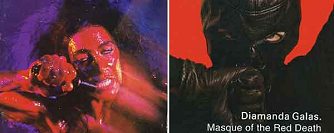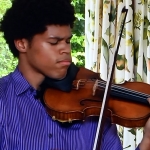Diamanda Galas THE WHOLE STORY
Raised in San Diego, California, by Greek Orthodox parents Galas is one of the finest avant-garde musicians in the world. Regarding her quite extraordinary music, this is a brief background to how it came about, in her own words.

What was your musical training?
After many years of basic classical piano lessons, I studied these avant-garde piano works in university graduate school. Then I started playing with free jazz guys like David Murray, Butch Morris - post Albert Ayler, post-Coltrane musicians. At the time it was a very heavy black scene not open to women. But I had played piano for many years that they couldn’t deny I could do it.
After playing piano for awhile with all these guys from the post-Ornette Coleman, I thought, ‘No, the voice is the first instrument.’ These players have always modelled their mode of expression after the voice. They revered singers like Billie Holiday: often, the way they played was a reaction to the voice. The voice is the primary vehicle of expression that transforms thoughts into sounds, thought into message. And beyond the words (with all due respect to them), the combination of vocal and verbal energy can be overwhelming.
I started working on my AIDS project (PLAGUE MASS) over two years before my brother became ill. Half of my friends are HIV-positive; this is my life. These journalists who are outside the community look at my work and it scares them because it’s the voice of the people who are sick themselves. Because it doesn’t offer ‘entertainment,’ they can’t imagine that people want to hear it. They look at music as a placating medium… I separated my work from a safe and useless concept of ‘music’ back in 1974. Music that is meaningful contains a distillation of reality - and usually that’s tragedy.

And From Her Biography…
Galas treats her piercingly beautiful multi-octave voice as an instrument whose sound defies description, penetrating like wind to the bone, resurrecting the dead in the living. She stands alone by virtue of her extraordinary technical accomplishment and her passionate commitment to the principle that the personal is the political. The themes she addresses are universal - a ferocious grieving of real and immediate loss-taking material from a wide variety of cultures and eras. The sorrow of which she sings addresses in chilling recollection, man’s inhumanity to man, songs of life and death, redemption and damnation, of human pain and suffering which is experienced directly by the audience.
REVIEWER’S QUOTE
“Imagine a three-and-a-half octave range singing voice that can go from a blood-curdling shriek of an animal in a slaughterhouse to a beautiful and gravelly melancholy moan like a Billie Holiday record. Now, put that voice in a woman who sees injustice and hypocrisy everywhere and refuses to keep quiet about it. If you are imagining something frightening and supernatural, you probably have a pretty clear idea of what Diamanda Galás is about.” Benjamin Fasching-Gray.
ABOUT DEFIXIONES, WILL AND TESTAMENT

DEFIXIONES is meant to stand as a reminder, a warning and a hex against the perpetrators of genocide. The title comes from Hellenic tradition. “Defixiones were made out of stone and put on top of the bodies in graves to warn people not to tamper with graves, or else their daughter, and her daughter’s daughter and her daughter’s daughter would meet with unhappy circumstances,” Diamanda explains. “But the defixiones that I primarily focused on were used to threaten people like the Turks against digging up the grave of an Armenian or a Greek. It’s very serious. It’s not horror films.” She shows me a picture of a clay female figure, bound and pierced by 13 iron needles before continuing, “This is like voodoo. This is the shit. This is the shit that people don’t know about. It exists all through the Middle East.”
The piece itself is about more than just these ancient curses. “It is a human need,” Diamanda believes, “to leave a document that you existed and what might have happened to you, and why you weren’t able to do what you wanted to do. Before I die, I am going to write all these things so that you know what has happened to me.’ What happens to people when they are a minority? They learn to walk by buildings without being seen, they wear fezzes even if they are Christians. They wear everything to look like the majority so that nobody will attack them. The burning of Smyrna in 1922 was a really horrible event for the Greeks and it’s something that was covered up immediately, considered to be unimportant by the big powers because they were all, as they are now, fighting for popularity with Turkey. The Greeks were being forced to the edge of the pier, and the pier was set on fire. So, either they burned on the pier, or they drowned, or they tried to swim out to the boats to get picked up - but nobody would pick them up. They refer to it as a holocaust, but it’s not one that’s talked about.”
“When a situation is unresolved and no one has apologized for it and no one even writes about it as if it were a real situation, that makes a person live in an almost catatonic way and not be able to get on with their lives,” Diamanda observes. “People say to the Armenians, ‘You should get over this.’ Listen man, you do not get over something unless people apologize. You cannot forgive unless someone apologizes. The Turks won’t apologize for many reasons. They don’t want to have to pay all the people who they ripped off, as the Germans had to pay the Jews. They don’t want to have a to admit that they’re barbarians, which they are. They don’t want to admit a lot of things.”

To combat the denial,Diamanda included the poem The Dance by Siamanto in DEFIXIONES. The Dance tells this story: Siamanto is in a room, nursing a woman who is dying from stab wounds. He hears music outside his window and he looks to see men whipping naked women and forcing them to dance. He then watches the men cover the women in kerosene and burn them alive. The poet asks, ‘How can I dig out my eyes?’ Diamanda adds, “Siamanto was a soldier and a poet, discussing what the Turks were doing to the Armenians. He was executed by the Turks during the genocide of 1915.”
Other poets who found their way into her work have also faced exile. Adonis had to flee Syria for Lebanon, where he composed The Desert, a poem about Beirut in 1982. César Vallejo, who has two poems in DEFIXIONES, “was half-Peruvian and half-Spanish. He was imprisoned a few times,”Diamanda reveals. Galás was most eager totally about Henri Michaux.” He was a head case, he was truly perverse,” she laughs. “He was one of the most misanthropic people who ever existed, as well as a great poet. He wrote hexes - real hexes. He wrote them with a certain rhythmic structure so that they would work. He said, ‘If they don’t work, they don’t work but I’m very serious in m writing of them.’ And he was. Anything that he’s written about his work underlines a certainty that he was not worrying about being an aesthete, per se.” Some brief, gut-wrenching verses from anonymous writers and some original lyrics fill out the program.
The words in DEFIXIONES are clear enough, but Diamanda Galás is a musician and it is with her singing and piano playing that she gets her point across. DEFIXIONES contains elements of Rembetika music, a melange of Middle Eastern melodies that sounds like rough and tumble belly dance music. “You’d have Greeks, Turks and Armenians all in the same band. They were all friends, it never occurred to them that they should have any problems.” Diamanda said, “The Rembetika stuff was all these guys playing together. They weren’t political. They were smoking hashish together. They would have a good time and sing this beautiful music. When they had the exchange of populations, the Greeks were forced to leave, and they moved to Piraeus and to Thessaloníki and different places. Most of them spoke Turkish better than they spoke Greek. They go to Greece and suddenly, ‘Oh! We’re Greek?’ There was suddenly an artificiality between what is Christianity and what is Islam, and suddenly these people were told they were Greek. They were considered to be foreigners and not particularly loved by the Greeks on the mainland, so they stuck together and they formed clubs and groups - that kind of immigrant thing - and they played this music, which then became very popular.”
Rembetika was attacked by the Greek establishment. The lyrics were about sex, violence, and drugs, in the street slang of the hashish smoker. It was felt that Middle Easterness of Rembetika, the undefinable Turkishness of it, would somehow keep Greece from joining Europe. To survive, the music finally conformed to the wishes of the government. “What people hear in Greece, unless they go to the right places, is not the music that it used to be. It is an approximation, from the imagination of some political musicologist. It is such an artificial thing. They never think that the music is a living form. When they try to do that surgery, they just destroy the music and the culture.”

One element of Rembetika that Diamanda brings to DEFIXIONES is a kind of improvisational singing called Amanes. “Aman is an expression of emotion that is extreme and can’t be said in words, and it is common to the whole Middle East.” Rembetika is played on bouzoukis and ouds, but Diamanda has only a piano. “I use the piano in a very simple way and then use the voice to articulate all the ornamentation, the tones in-between, because you’re not going to be able to do that unless you have a stringed instrument.”
If DEFIXIONES sounds like some sort world-beat folk concert, keep in mind that Galás has not given up using machines to augment her voice. “This work has a certain amount of electronic processing, especially in the Henri Michaux and the Vallejo. When you produce a vocal noise and then you put it through remodulation, you can get to a point where it is not actually a vocal sound. You can get into something that is much more visceral because it is vocally generated. No matter how well you can play the keyboard, you can’t compete with the directness of the voice.” And especially when that voice belongs to one Diamanda Galas.

Benjamin Fasching-Gray
|
|

|

Neil Cowley Trio |
LATEST GALLERY IMAGES

The Kanneh-Masons 
Sting 2025 |
|
|

